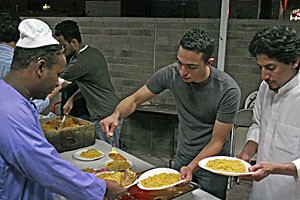It was a big weekend for campus faithful, as UA Jewish students rang in a new year and UA Muslims began a month of fasting and reflection.
The Jewish holiday, Rosh Hashana, began the year 5767 of the Jewish calendar. It started Friday at sunset and lasted until sunset last night.
Ramadan, the Muslim holy month, began this weekend as well.
During the next month, Muslims will be fasting from sunrise to sunset every day in an effort to focus on their spiritual selves.
Jacob Wilkenfeld-Mongillo, an employee of the Hillel Center, said Rosh Hashana is a festive Jewish holiday that is very family-oriented. That’s why many UA community Jews chose to go home for the weekend, he added.
It is a holiday to reflect on the past year and can be an opportunity for self-growth, Wilkenfeld-Mongillo said.
The Hillel Center expected about 400 people to attend the Saturday Rosh Hashana service
I find that fasting makes me more focused on my classes than when I’m not, because there’s nothing else to focus on the whole day.
– Ehab Tamimi,
chemical engineering sophomore
for Reform Jews in the grand ballroom of the Student Union Memorial Center. The center also sponsored Saturday and Sunday services for followers of Conservative Judaism in the Hillel Center, Wilkenfeld-Mongillo said.
The Hillel staffer said he went home for Rosh Hashana every year when he was an undergrad at another university. Though he won’t be going back this year, his plans for the holiday still included his family.
“”I’m going to be on the phone with the folks a lot,”” Wilkenfeld-Mongillo said.
On Rosh Hashana, families typically have large, celebratory dinners. They also usually attend the holiday services together.
“”It’s kind of weird, because I usually have my brother to be my excuse to leave every now and then because I’m bored,”” said Michelle Blumenthal, an undecided freshman.
Blumenthal said her roommate went home for the weekend, and she wanted to go herself. She said this is the first time she has ever spent the holiday, or the longer-than-usual religious service, without her family.
Christine Dykgraaf, an adjunct instructor in the department of Near Eastern studies, said Ramadan and the feast at the end of the month, Eid al-Fitr, are Muslim holidays that place emphasis on an entire faith community.
Ehab Tamimi, a chemical engineering sophomore, said he had been observing Ramadan by fasting for nine years.
Tamimi said the Islamic Center of Tucson offers fast-breaking dinners and prayer services every night for the whole month.
The sunrise-to-sunset fasting during Ramadan is meant to foster personal cleansing and spiritual renewal, Dykgraaf said. Fasting also encourages Muslims to sympathize with the less fortunate, who do not have access to food and water every day.
“”You really feel the value of these kinds of blessings on you during this month,”” Tamimi said.
Fasting can be difficult, as participants are supposed to deny themselves every form of nourishment, including water.
But fasting doesn’t hinder a person’s studies, Tamimi said. In fact, it has the opposite effect.
“”I find that fasting makes me more focused on my classes than when I’m not because there’s nothing else to focus on the whole day,”” Tamimi said.
Dykgraaf said Ramadan varies across the world, but that it can be more difficult to observe in the U.S. because the majority of people don’t fast during the month and so society continues as normal.
Tamimi, who said he lived half his life in Palestine, said that observing Ramadan is different in America.
“”Here it’s not a big deal,”” Tamimi said. “”But back home, the whole city slows down.””









